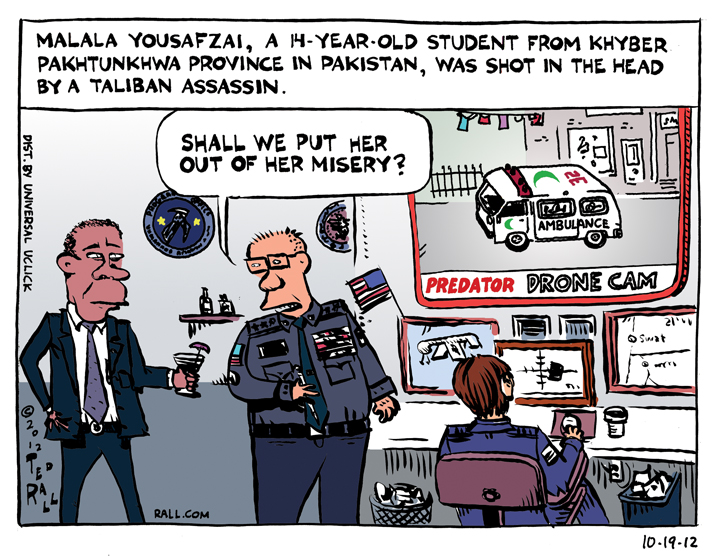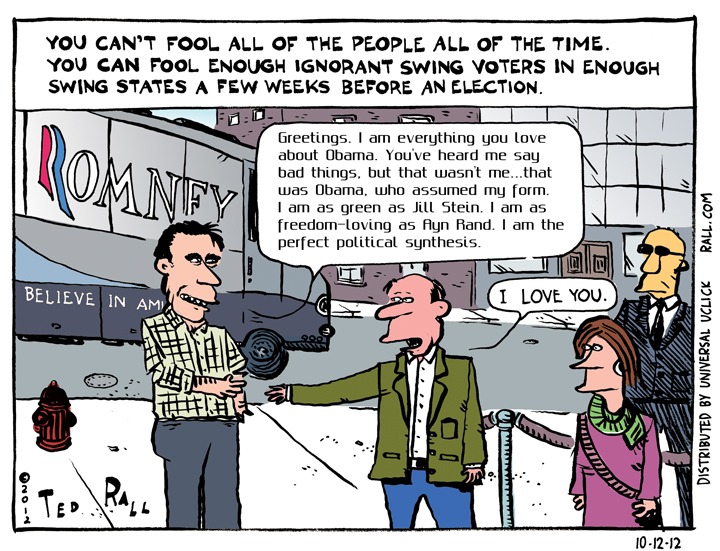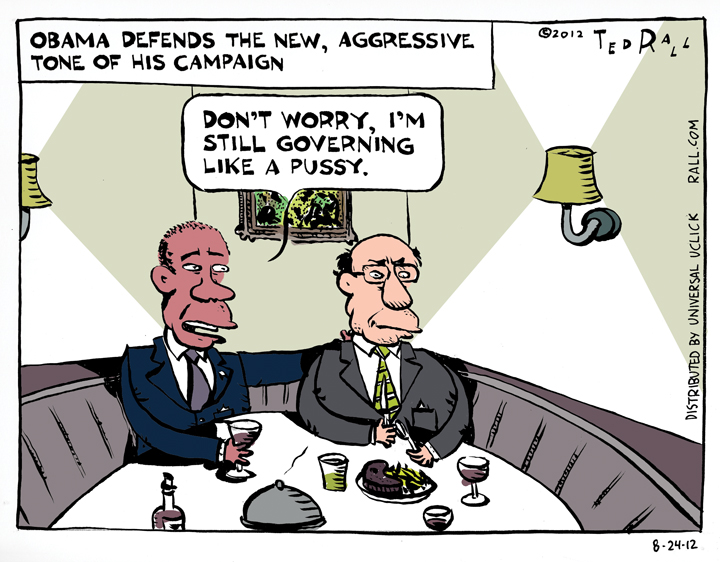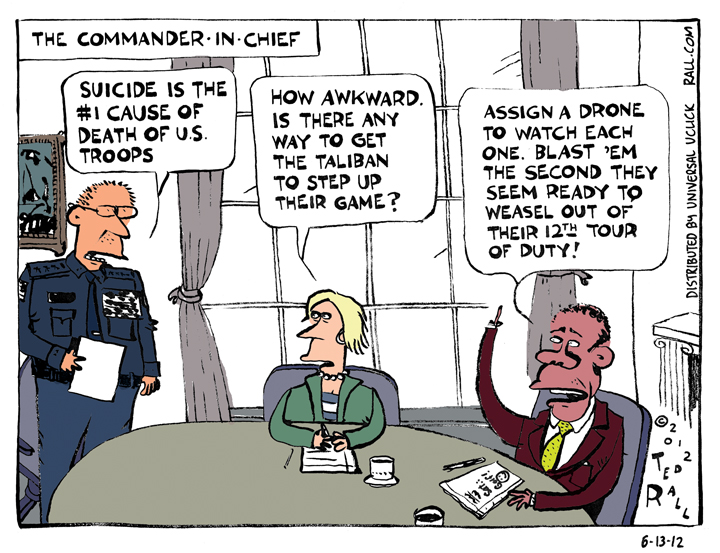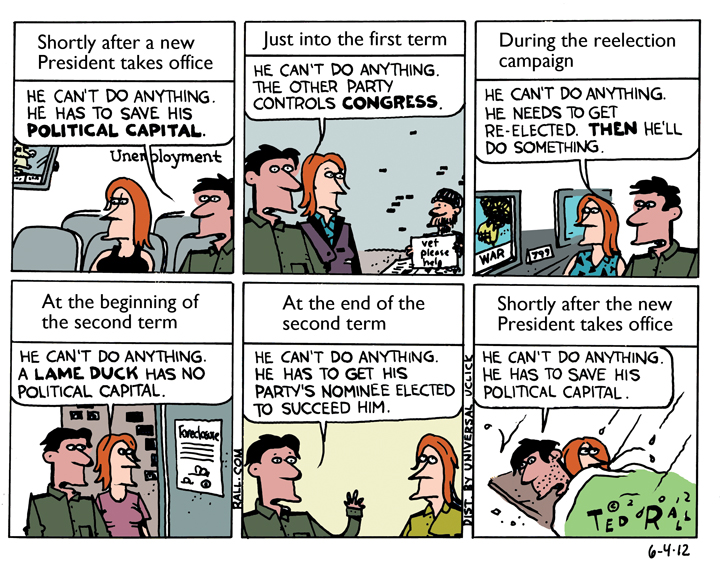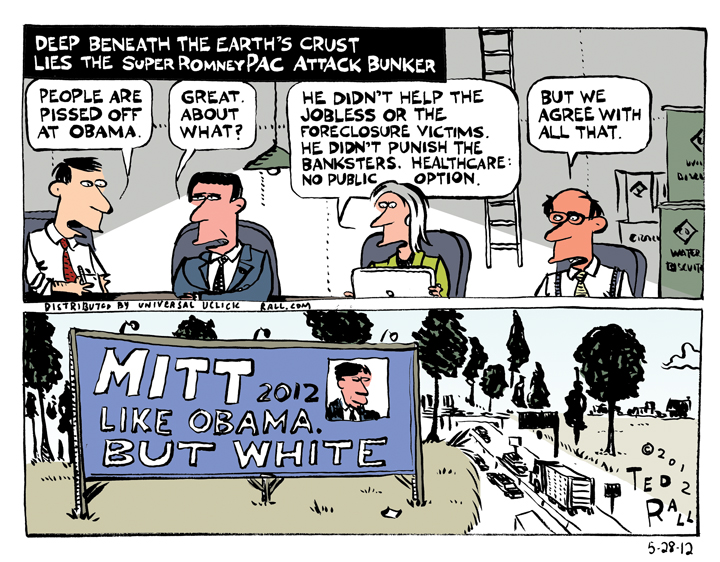The world is aghast about the shooting of 14-year-old activist and student Malala Yousafzai, from Khyber Pakhtunkhwa Province by the Taliban. But what’s the difference between that atrocity and the murders by the U.S. of other Pakistani civilians using Predator drone planes?
SYNDICATED COLUMN: Big Bird is a 1%er
Romney’s Silly But Salient Point on PBS
“I like PBS. I love Big Bird. Actually, I like you, too,” Mitt Romney told Jim Lehrer in the most quoted line from the first presidential debate. “But I’m not going to keep on spending money on things to borrow money from China to pay for.”
Huge news!
If deficit spending will be verboten under the Mittocracy, what will happen to all those out-of-work soldiers and defense contractors? Where will the drones crash after they run out of gas?
But let’s not talk about that either. Apparently I’m the only person in America who noticed that the military-industrial complex is about to go out of business.
People are instead focusing on Romney’s call to cut the $445 million a year the federal government–which amounts to a paltry 1.2% of 1% of the federal budget–contributes to the Corporation for Public Broadcasting, which subsidizes PBS and NPR.
My fellow political cartoonists are having a field day, echoing President Obama’s hat tip to the O.J. case: “Elmo has been seen in a white Suburban. He’s driving for the border.” The New York Times’ Charles M. Blow riffed: “Big Bird is the man. He’s eight feet tall. He can sing and roller skate and ride a unicycle and dance. Can you do that, Mr. Romney?” A co-creator of “Sesame Street” dismissed Romney as “silly.”
Silly? Definitely.
But is Romney right? Probably.
Candidates and parties aren’t important. Ideas are. If we’re ideologically consistent, if we want to appear credible when we criticize right-wingers like Romney, we left-of-center types have to hold ourselves to the same (or higher) standards as those to which we subject our enemies. We have to admit when they’re correct, even–especially–when it’s about something as trivial as this.
This is a time when we have to give the devil his due.
Until recently I was unaware of the exorbitant salaries received by executives and top employees of federally-subsidized broadcasting networks. In a 2011 op-ed for The Wall Street Journal, Senator Jim DeMint (R-SC) pointed out that PBS paid its president, Paula Kerger, over $600,000 a year–more than the President of the United States. “Kevin Klose, president emeritus of NPR…received more than $1.2 million in compensation, according to the tax forms the nonprofit filed in 2009,” wrote DeMint. “Sesame Workshop President and CEO Gary Knell received $956,513 in compensation in 2008.” (Now Knell runs NPR, which pays him about $575,000.)
Actor Carroll Spinney, who plays Big Bird and Oscar the Grouch, was paid more than $314,000 last year.
The liberal Center for American Progress countered: “While those numbers are not exactly chump change, it’s pennies compared to the salaries of another industry the U.S. taxpayers subsidize at much higher cost–Big Oil.”
But that’s red-herring sophistry.
Wasteful federal spending on overpaid executives is wrong, whether it’s for planet-murdering energy corporations, or on a network that airs free educational TV that helps ready kids for school with basics like counting, math and even Spanish.
Kill both.
“Like for-profit media companies, Sesame [and PBS] needs to pay top dollar to attract talent,” MSN’s Jonathan Berr argues, sounding like a Fortune 500 corporation defending sky-high CEO paychecks.
I disagree.
NPR and PBS do an OK job reporting the news–as long as it happens on a weekday–but that’s not the point.
If you accept public money, you’re in public service and should get paid accordingly. Which is to say, fairly–and at the lowest fair cost to taxpayers.
If you can’t find someone qualified to run NPR or PBS, or an actor up to the task of playing Big Bird, for $100,000 a year–especially in this job market–you’re not looking hard enough. Something is off-kilter when the studios of publicly-funded shows like NPR’s “All Things Considered” are centrally located and sumptuously furnished with mahogany tables and the latest high-tech gadgetry, while those of privately-owned 50,000-watt talk-radio powerhouses are situated in the slums and look like 1970s-era flophouses.
Salary figures for NPR “stars” like Robert Siegel ($341,992), Renee Montagne ($328,309), Steve Inskeep ($320,950), Scott Simon ($311,958) and Michele Norris ($279,909) are three to four times more than top-rated talk-radio hosts in the biggest markets get. How dare these 1%ers shake us down during pledge drives, much less collect federal taxdollars?
PBS only receives 15% of its funding from the feds. For NPR it’s 2%. As a former NPR exec confided, given the political heat they take over it, they’d might be better off cutting the strings. Then they’d be free to stop giving lying conservatives “equal time” to seem “fair.”
Why is the government giving broadcasters money they don’t need? There’s a much stronger argument for propping up newspapers, which remain the original source of 95% of news stories. Print media is in big trouble: the newspaper industry has shrunk 43% since 2000. Analysts say that even that chart-filled ubiquitous denizen of hotels USA Today may fold. If the feds want to do something good for journalism–and the well-informed populace required for vibrant democracy–they should start by subsidizing print newspapers.
But only if their editors and publishers don’t get paid ridiculous salaries.
(Ted Rall‘s new book is “The Book of Obama: How We Went From Hope and Change to the Age of Revolt.” His website is tedrall.com. This column originally appeared at MSNBC’s Lean Forward blog.)
COPYRIGHT 2012 TED RALL
The Book of Obama: From Hope and Change to the Age of Revolt
How did a charismatic young president elected in an atmosphere of optimism and expectation lead the United States to the brink of revolution? From a chance encounter in the early 1980s to the Democratic primaries of 2007-08, I was one of the first to size up Barack Obama as we know him now: conservative, risk-averse and tone deaf. In The Book of Obama I revisit the rapid rise and dizzying fall of Obama–and the emergence of the Tea Party and Occupy movements–and draw a startling conclusion: We the People weren’t lied to. We lied to ourselves, both about Obama and the two-party system. We voted when we ought to have revolted. Here’s the story of what went wrong — and a prescription for real change.
In The Book of O(bama): From hope and change to the age of revolt, Rall lays out his case, and it’s a strong one, for why we should revolt instead of vote, how the only hope we have for real change in this country is to trash the broken Democratic-Republican duopoly and create something new that better serves a diverse nation. —Phoenix New Times
Political Analysis/History, 2012
Seven Stories Press Trade Paperback, 6″x9″, 240 pp., $14.95
To Order From Amazon: click here.
To Order A Personally Signed Copy directly from Ted:
“Ted Rall is a terrific journalist and a take-no-prisoners political cartoonist.”
—San Diego Union-Tribune

